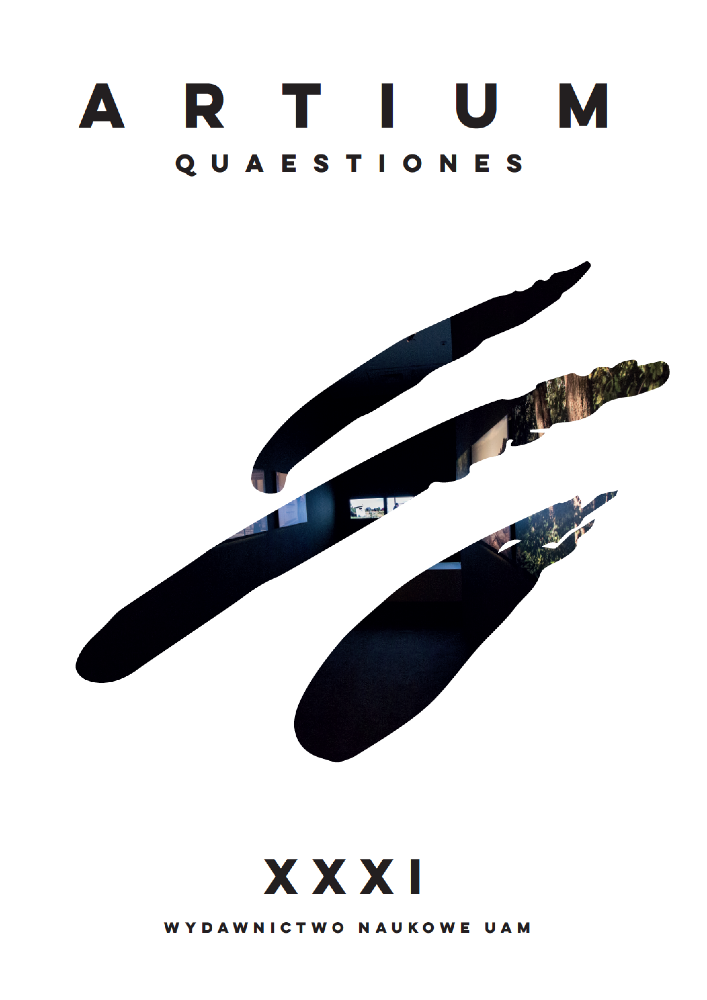Abstract
In the essay, the author, Łukasz Ronduda, relates his own work as an artist, a film director, an art historian and curator, discussed in the light of the cinematic turn and the formation of common ground between cinema and contemporary art in both artistic and institutional sense. Ronduda looks closely at his two full-length feature films: Performer (2015) and Serce miłości (Heart of Love) (2017) and highlights their wider context. The first frame of reference spans from experimental films to contemporary full-length productions dedicated to wide audience. The second reference is his own work involving academic research, curating, writing a novel and the creation of a found footage film. In this self-presentation, Ronduda discloses his different attempts to find the right medium to speak about and analyze contemporary art. The full-length film turned out to be particularly effective medium in its ability to express the truth by means of fiction, placing him between creation and institutional structure. Film as a medium of interpreting art seems to productively question fixed boundaries between research, criticism and art.
References
Brennan T., The Transmission of Affect, Ithaca–London 2004
Cieński A., Problematyka stylistyczna „Mikołaja Doświadczyńskiego przypadków”, Wrocław 1969
Cook B., Ł .Ronduda, The Films of Franciszka and Stefan Themerson, London 2007
Filipovic E., Artist as curator, London 2018
Gorczyca Ł., Ł. Ronduda, W połowie puste. Życie i twórczość Oskara Dawickiego, Warszawa 2010
Góra M., Sztuka Naszych Czasów. Recenzja „Serca miłości” Łukasza Rondudy, „Kultura Liberalna” 2017, 52(467), dostępny w internecie:
pl/2017/12/19/gora-sztuka-naszych-czasow-serce-milosci-recenzja/> [dostęp: 22 sierpnia 2018]
Jarecka D., „Performer” z Oskarem Dawickim w kinach. To film czy performance?, dostępny w internecie: <http://wyborcza.pl/1,75410,19007567,performer-z-oskarem-dawickim-w-kinach-to-film-czy.html> [dostęp: 26 sierpnia 2018]
Kidner D., The Long and Short. The evolution of the ‘artist’s feature film’, „Frieze” 2015, 173, s. 110
KwieKulik, red. Ł. Ronduda, G. Schollhammer, Warszawa–Wrocław–Wiedeń 2012
Majmurek J., Ocalić gest, „Filmweb” 2015, 9 października, dostępny w internecie: <https://www.filmweb.pl/review/Ocali%C4%87+gest-17900> [dostęp: 26 sierpnia 2018]
Majmurek J., Miłość i agon, „Krytyka Polityczna” 2017, 2 grudnia, dostępny w internecie: <http://krytykapolityczna.pl/kultura/film/milosc-i-agon/> [dostęp: 22 sierpnia 2018]
Majmurek J., Ł. Ronduda, Kino-Sztuka. Zwrot kinematograficzny w polskiej sztuce współczesnej, Warszawa 2015
Maliborski S., Przeleciał mnie dyskurs, „E-splot” 2011, 12 maja, dostępny w internecie: <http://www.e-splot.pl/?pid=articles&id=1262> [dostęp: 26 sierpnia 2018]
Margolis H., Kino-sztuka: czy koledzy filmowcy są naszymi kolegami?, „Szum” 2015, 10, s. 112
Margolis H., Performer, „Szum” 2015, 10, s. 165
Nader L., Afektywna historia sztuki, „Teksty Drugie” 2014, 1, s. 14–40
Oleszczyk M., Sztuka kochania, „Filmweb” 2017, 29 listopada, dostępny w internecie: <https://www.filmweb.pl/review/Sztuka+kochania-20815> [dostęp: 22 sierpnia 2018]
Piwowarska B., Ł. Ronduda, Polska nowa fala. Historia zjawiska, którego nie było, Warszawa 2007
Poprzęcka M., Na oko: „Serce miłości”, „Dwutygodnik.com” 2018, dostępny w internecie: <https://www.dwutygodnik.com/artykul/7593-na-oko-serce-milosci.html>[dostęp: 22 sierpnia 2018]
Ronduda Ł., Strategie subwersywne w sztukach medialnych, Kraków 2006
Ronduda Ł., Kino niezdolne do eksperymentu, „Gazeta Wyborcza” 2007, 11 grudnia, s. 8
Ronduda Ł., Sztuka polska lat 70. Awangarda, Warszawa 2009
Ronduda Ł., F. Zeyfang, 1, 2, 3 awangarda… Film/Sztuka pomiędzy Eksperymentem a Archiwum, Warszawa 2006
Sielewicz N., opis wystawy „Bling Ring” w korespondencji z autorem, 7 lipca 2018
Sienkiewicz K., Sztuka przypisów, „Dwutygodnik” 2011, 3, dostępny w internecie: <http://www.dwutygodnik.com/artykul/1996-sztuka-przypisow.html> [dostęp: 26 sierpnia 2018]
Stachówna G., O melodramacie filmowym, w: Kino gatunków wczoraj i dziś, red. K. Loska, Kraków 1998, s. 28–46
Sobolewski T., Już mieliśmy nową falę, „Gazeta Wyborcza” 2008, 1 kwietnia, s. 14
Sobolewski T., Polak na Berlinale: Przepraszam za mój film, „Gazeta Wyborcza” 2015, 9 lutego, s. 5
Szabłowski S., Śmierć Performera, „Dwutygodnik” 2011, 2, dostępny w internecie: <https://www.dwutygodnik.com/artykul/5849-smierc-performera.html> [dostęp: 26 sierpnia 2018]
Informacja o filmie Cameo, galeria Triple Candie, New York, dostępna w internecie: <http://www.triplecandie.org/2010%20Cameo.html> [dostęp: 26 sierpnia 2018]
Informacja o wystawie All that remains… The Teenagers of Socialism, galeria Waterside Project Space, London, dostępna w internecie: [dostęp: 26 sierpnia 2018]
Informacja o projekcie Book Lovers, Museum van Hedendaagse Kunst w Antwerpii, dostępna w internecie: <https://ensembles.mhka.be/items/w-polowie-puste?locale-en> [dostęp: 26 sierpnia 2018]
Informacja o konkursie NAGRODA FILMOWA Polskiego Instytutu Sztuki Filmowej i Muzeum Sztuki Nowoczesnej w Warszawie, Warszawa 2011, dostępna w internecie: <https://www.pisf.pl/aktualnosci/nagroda-filmowa-pisf-i-msn> [dostęp: 26 sierpnia 2018]
Wypowiedzi na temat Warsaw Gallery Weekend, „wyborcza.pl” 2014, 26 września, dostępne w internecie: <http://wyborcza.pl/1,75410,16711245,Ekwiwalent_pieniezny__Artysci_mowia_o_ekonomii_podczas.html> [dostęp: 22 sierpnia 2018]
License
Copyright (c) 2020 Łukasz Ronduda

This work is licensed under a Creative Commons Attribution-NonCommercial-NoDerivatives 4.0 International License.
The copyrights are regulated by author's statement and publication agreement prepared by Adam Mickiewicz University Press. The authors are responsible for the originality of texts published and regulating the copyrights of accompanying visual materials, unless the materials come from the Editorial Team.
This work is available with the following licence: Attribution-NonCommercial-NoDerivatives 4.0 International License
Attribution-NonCommercial-NoDerivatives 4.0 International License
